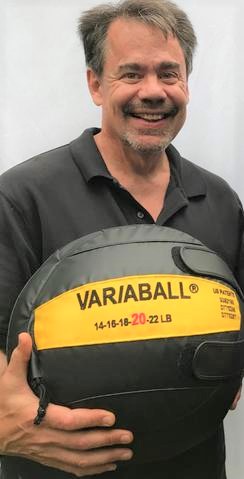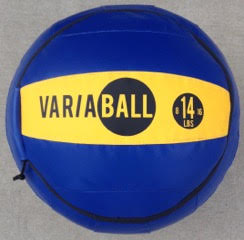CrossFit workouts get too cluttered.
That’s what drove a Louisville resident’s to make kettlebells and medicine balls designed to hold varying amounts of weight.
“Both of the ideas came because I had been doing CrossFit and didn’t want multiple products around,” said Gary Pawlas.
The kettlebells are still a work in progress. But Pawlas, 60, launched Varia Fitness online in October, selling his patented variable-weight medicine balls — dubbed “Variaball.”
The medicine balls unzip, allowing customers to add or remove weights that rest in fixed cylinders inside the ball.
“What is cool about it and unique and patentable is that it basically stays balanced as you add weight,” Pawlas said.
There are two versions. A Variaball that can weigh from 8 to 16 pounds retails for $245, while one weighing from 14 to 22 pounds goes for $295. In addition to the company’s website, the products also are sold at CrossFit Cielo, where Pawlas works out.
He has worked in mechanical engineering and taught at the University of Colorado Boulder for 10 years before becoming an independent consultant in 2012.
Pawlas said the fabric shell of the medicine ball is made in Pakistan, and he assembles the rest of the product in his garage. He’s hired four students from CU Boulder to help.
“We buy components locally and then use my mechanical engineering background to make the manufacturing tools and foam,” he said.
Pawlas said he has invested $75,000 of personal funds, and money from friends and family, into the business.
Varia Fitness also has patented a design for the variable weight kettlebell, and Pawlas said he will start developing a prototype in early 2019.
“We think the ideal user is someone who’s space-constrained who wants five medicine balls or five kettlebells,” Pawlas said. “It saves space, it’s high-quality and allows you to change weights really quickly.”
Pawlas said he has considered licensing the product and is talking with companies that make smart sensors for workout products so that users can measure the speed and force they’re putting into their workouts.
Pawlas isn’t the only person tinkering in this space. A German Kickstarter campaign for variable-weight kettlebells and dumbbells was successfully funded last year, raising $20,473.
CrossFit workouts get too cluttered.
That’s what drove a Louisville resident’s to make kettlebells and medicine balls designed to hold varying amounts of weight.
“Both of the ideas came because I had been doing CrossFit and didn’t want multiple products around,” said Gary Pawlas.
The kettlebells are still a work in progress. But Pawlas, 60, launched Varia Fitness online in October, selling his patented variable-weight medicine balls — dubbed “Variaball.”
The medicine balls unzip, allowing customers to add or remove weights that rest in fixed cylinders inside the ball.
“What is cool about it and unique and patentable is that it basically stays balanced as you add weight,” Pawlas said.
There are two versions. A Variaball that can weigh from 8 to 16 pounds retails for $245, while one weighing from 14 to 22 pounds goes for $295. In addition to the company’s website, the products also are sold at CrossFit Cielo, where Pawlas works out.
He has worked in mechanical engineering and taught at the University of Colorado Boulder for 10 years before becoming an independent consultant in 2012.
Pawlas said the fabric shell of the medicine ball is made in Pakistan, and he assembles the rest of the product in his garage. He’s hired four students from CU Boulder to help.
“We buy components locally and then use my mechanical engineering background to make the manufacturing tools and foam,” he said.
Pawlas said he has invested $75,000 of personal funds, and money from friends and family, into the business.
Varia Fitness also has patented a design for the variable weight kettlebell, and Pawlas said he will start developing a prototype in early 2019.
“We think the ideal user is someone who’s space-constrained who wants five medicine balls or five kettlebells,” Pawlas said. “It saves space, it’s high-quality and allows you to change weights really quickly.”
Pawlas said he has considered licensing the product and is talking with companies that make smart sensors for workout products so that users can measure the speed and force they’re putting into their workouts.
Pawlas isn’t the only person tinkering in this space. A German Kickstarter campaign for variable-weight kettlebells and dumbbells was successfully funded last year, raising $20,473.



Leave a Reply